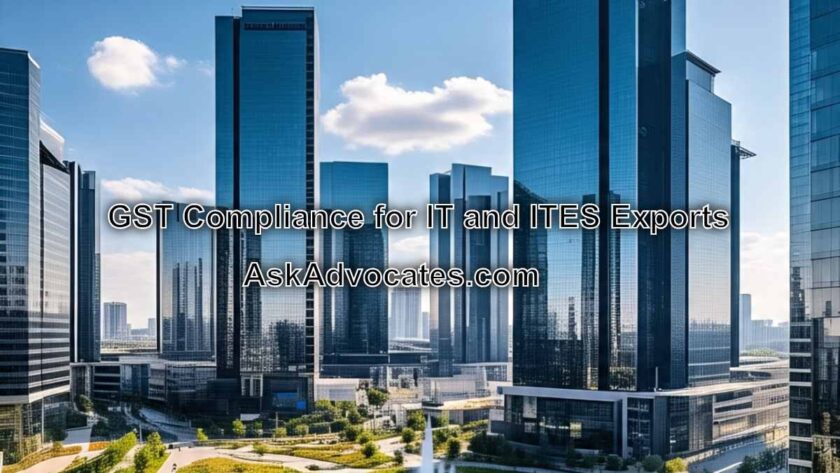Navigating GST compliance for IT exports and ITES sectors requires precision amid evolving regulations. From optimizing ITC claims for exports to resolving delays in GST refunds, exporters face challenges in place of supply rules, documentation, and litigation risks. AskAdvocates Law Chamber offers specialized legal consultancy for GST, providing 24×7 litigation support to tackle disputes, audits, and compliance gaps. Our experts streamline refund processes by ensuring error-free filings of BRCs, FIRCs, and GST returns, while strategic ITC optimization maximizes liquidity. With deep expertise in IT/ITES GST frameworks, we clarify place of supply complexities and mitigate penalties through proactive audits. Whether resolving mismatched invoices or representing clients in appeals, our tailored strategies future-proof your business. Keywords: GST compliance for IT exports, ITES GST refunds, legal consultancy for GST, AskAdvocates Law Chamber, GST litigation support, ITC claims for exports. Need reliable GST guidance? Contact AskAdvocates Law Chamber for 24×7 compliance support tailored to IT/ITES exports.
Why GST Compliance is Critical for IT/ITES Exporters
Risks of Non-Compliance
Non-compliance with GST regulations exposes IT/ITES exporters to significant financial and operational risks. Penalties for delayed filings, incorrect tax calculations, or mismatched documentation can range from 10% to 100% of the tax due, straining cash flow. Furthermore, non-compliance may trigger audits, leading to prolonged scrutiny and reputational damage. For instance, discrepancies in export invoices or place-of-supply declarations can result in denied refunds, directly impacting profitability. Conversely, proactive compliance ensures uninterrupted access to zero-rated benefits and Input Tax Credit (ITC), safeguarding liquidity.
Role of Legal Consultancy in Mitigating Risks
Engaging legal consultancy services like AskAdvocates Law Chamber helps businesses navigate GST complexities with precision. Experts provide clarity on evolving regulations, ensuring accurate tax classification and documentation. For example, misinterpretations of “export of services” under Section 2(6) of the IGST Act can lead to incorrect tax rates; legal advisors mitigate this by aligning contracts with GST definitions. Additionally, they represent businesses during disputes, minimizing penalties. Consequently, exporters gain confidence in maintaining compliance while focusing on growth.
Benefits of Proactive Compliance
Proactive GST compliance enhances operational efficiency and financial predictability. By adhering to filing deadlines and accurately reporting zero-rated supplies, exporters expedite refunds and optimize ITC claims. Moreover, robust compliance frameworks reduce audit risks and foster trust with authorities. For instance, maintaining digitized records of shipping bills and bank realization certificates (BRCs) streamlines refund verification. Ultimately, compliance becomes a competitive advantage, enabling businesses to scale globally without regulatory setbacks.
Key Challenges in GST for IT/ITES Exports
Complexities in Place of Supply Rules
Determining the “place of supply” for IT/ITES exports remains a persistent challenge. Under Section 13 of the IGST Act, the default rule for services is the recipient’s location, but exceptions exist for intermediaries or intra-company transactions. Misclassification can lead to incorrect tax rates—for example, treating an export as a domestic supply attracts 18% GST instead of zero-rating. Conversely, proper classification ensures tax neutrality. Legal expertise is critical to interpret contracts and apply location-specific rules accurately.
Delays in GST Refunds
Delayed refunds strain liquidity, especially for SMEs reliant on timely reimbursements. Common causes include mismatched GST returns, incomplete documentation, or verification bottlenecks. For instance, missing BRCs or foreign inward remittance certificates (FIRCs) often stall refund processing. Furthermore, manual errors in Form GST RFD-01 filings trigger queries, prolonging delays. To mitigate this, exporters must adopt systematic documentation practices and leverage automation tools for error-free submissions.
Managing Input Tax Credit (ITC) Claims
ITC claims for exports face scrutiny due to strict eligibility criteria. Blocked credits (e.g., employee travel expenses) and mismatched invoices between GSTR-2A and GSTR-3B often lead to reversals. Additionally, exporters must prove ITC is linked to taxable supplies, including exports. Regular reconciliation and legal guidance help avoid disallowances, ensuring maximum credit utilization.
Navigating Place of Supply Rules and ITC Optimization
Determining the Place of Supply
For IT/ITES exporters, the place of supply hinges on service recipient details. If the client is overseas, services qualify as exports (zero-rated). However, if the recipient’s location is India, domestic GST applies. Legal advisors help draft contracts specifying service nature and recipient details to avoid ambiguity.
Strategic ITC Optimization Strategies
- Audit Input Services: Identify eligible credits tied to exports, such as software licenses or cloud infrastructure.
- Reconcile Invoices Monthly: Match supplier invoices with GSTR-2A to prevent mismatches.
- Document Export Links: Maintain records proving ITC is used for zero-rated supplies.
AskAdvocates Law Chamber optimizes ITC by reviewing procurement cycles and advising on credit eligibility.
Legal Frameworks for Compliance
Firms must align with GST Council notifications and judicial precedents. For example, the ABC Ltd. vs. GST Department case clarified ITC eligibility for export-related marketing expenses. Legal consultants ensure businesses stay updated on such rulings, minimizing litigation risks.
Streamlining GST Refunds and Export Documentation
Steps to Accelerate Refund Processing
- File Accurate Returns: Report exports under “zero-rated supplies” in GSTR-1 and GSTR-3B.
- Submit Refund Applications Timely: File Form RFD-01 with export invoices, BRCs, and delivery challans.
- Monitor Portal Updates: Respond to department queries within 15 days to prevent lapses.
Common Documentation Pitfalls
Missing or inconsistent documents are primary refund blockers. Key records include:
- Signed export invoices with GSTIN and client details.
- BRCs/FIRCs confirming foreign currency receipt.
- Shipping bills or digital service delivery proofs.
Leveraging Technology for Compliance
Automated GST platforms reduce manual errors in invoice generation and return filing. AskAdvocates integrates clients with compliant software, ensuring seamless documentation.
How AskAdvocates Law Chamber Enhances GST Compliance
24×7 Litigation Support for Disputes
Facing a GST notice? AskAdvocates provides round-the-clock litigation support, resolving disputes over refunds, ITC, or tax classifications. Their team represents clients in appeals, ensuring minimal business disruption.
Proactive Compliance Audits and Advisory
Regular audits identify gaps in GST filings, documentation, or ITC claims. For example, a recent audit for a SaaS exporter recovered ₹50 lakh in blocked credits by reclassifying employee training costs.
Training and Future-Proofing Strategies
- Workshops: Quarterly updates on GST amendments.
- Compliance Manuals: Tailored checklists for export transactions.
- Risk Assessments: Pre-audit evaluations to mitigate scrutiny.
FAQs
Q: What documents are needed for ITES GST refunds?
A: Export invoices, BRCs, GST returns, and delivery proofs.
Q: How does place of supply affect GST?
A: Determines tax applicability; exports are zero-rated, domestic supplies taxed.
Q: Can ITC be claimed on export services?
A: Yes, if linked to taxable/zero-rated supplies and supported by invoices.
Q: Why choose AskAdvocates for GST issues?
A: 24×7 expert support, litigation experience, and sector-specific solutions.
Q: How to avoid refund delays?
A: Ensure accurate filings, document consistency, and prompt query resolution.
Contact AskAdvocates Law Chamber for 24×7 GST compliance support tailored to IT/ITES exports.
Read More
Compliance Audits Made Simple: Expert Legal Support for Corporate Entities



